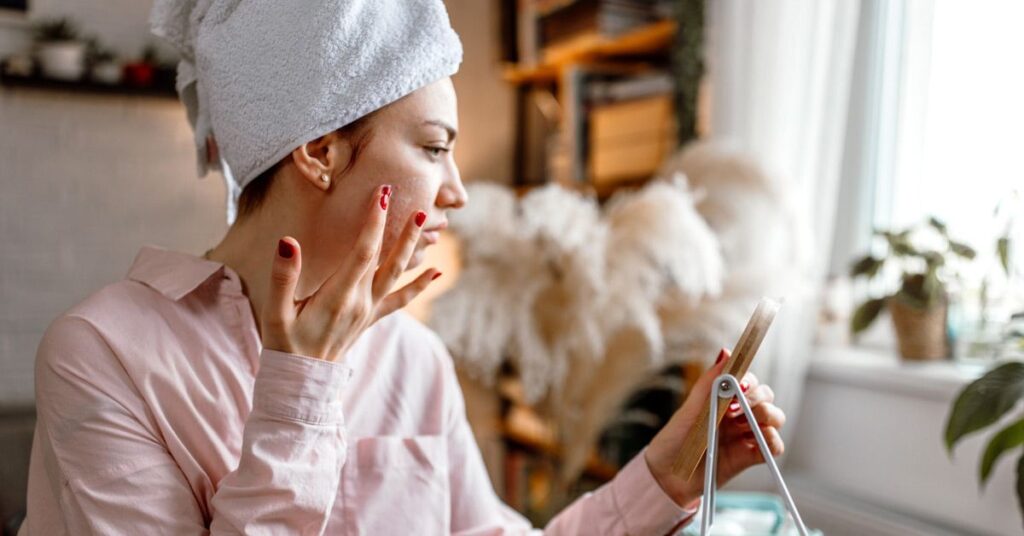- Baking soda is growing in popularity as a skin care ingredient on social media platforms like TikTok.
- Proponents say that baking soda can improve skin tone, lighten dark spots, and clear up acne.
- Experts warn that baking soda can damage the skin’s PH balance and cause long-term irritation and damage.
- Salicylic acid, glycolic acid, and niacinamide are effective skin care ingredients that are supported by scientific research.
The latest skin care ingredient gaining popularity on social media is also a kitchen staple.
Enthusiasts claim that baking soda can brighten dark spots, improve skin tone, and clear breakouts.
Some TikTok users, for example, have been mixing baking soda with water and applying it to their skin. Others have created their own at-home baking soda skin care products by combining it with coconut oil and vaseline.
Proponents say this makeshift exfoliant offers instant results, but dermatologists warn that applying baking soda to your skin may come with risks like irritation and sensitivity.
While baking soda may seem like a quick and affordable skin care solution, the beauty hack may do more harm than good.
“There is scant evidence on the use of baking soda for the skin,” Pooja Sodha, MD, associate professor of dermatology at the George Washington University School of Medicine and Health Sciences, told Healthline.
“Though social media trends show people with glowing or clear skin, it’s important to recognize that this is a very small group of people and skin appearance is a function of so much more than what you put on your face, for example, genetics, lifestyle, sleep, diet, etc,” she continued.
“To believe that one ingredient, such as this, can make the difference, is far too simplistic and dangerous.”
A prominent claim about baking soda as a skin care ingredient is that it may lighten dark spots and even out skin tone.
“People often tell me their skin looks brighter after using baking soda, and I understand why they think it’s working,” Hannah Kopelman, MD, a dermatologist at Kopelman Aesthetic Surgery, told Healthline.
“What is really happening is just a temporary change from removing oil and dead cells on the surface, while the deeper pigment that causes dark spots is not touched at all,” she explained.
Hyperpigmentation comes from melanin in the lower layers of the skin, and baking soda cannot reach that far. In fact, Kopelman said it’s possible that baking soda could make uneven skin tone and dark spots worse.
“I have actually seen it cause darker discoloration, especially in people with medium or deeper skin tones,” she said.
Those with persistent acne might be willing to try just about anything to clear up their skin, but baking soda could make it worse.
“It dries out pimples fast, and at first, it can look like it’s helping. But when I see people who have used it, their skin is often red, peeling, and breaking out even more,” said Kopelman.
This may be down to baking soda being too harsh and causing skin barrier damage.
“When the barrier is damaged, bacteria can get in and cause more inflammation. Acne needs gentle and consistent care, not harsh scrubbing or kitchen remedies,” Kopelman explained.
“When applied to healthy skin, baking soda may dismantle the acidic protective layer of the skin and strip natural lipids [or] oils from the skin,” she said.
“Over multiple applications, if not after one, this may lead to increased dryness, skin sensitivity, breakouts, and redness.”
Sodha said this additional side effect could exacerbate symptoms associated with chronic skin conditions like eczema or psoriasis.
With continued use, baking soda could disrupt the skin’s delicate pH balance and lead to long-term damage.
“Your skin naturally has a slightly acidic pH that helps it hold moisture and protect against bacteria. Baking soda is alkaline, which throws that balance completely off,” Kopelman said.
Once that happens, your skin may feel dry, flaky, and extra sensitive.
“I often compare it to removing your skin’s natural armor because it leaves you exposed and vulnerable. Things that never used to sting can suddenly cause irritation,” Kopelman added.
Over time, skin issues like these can become chronic.
“I have treated people who developed burning, stinging, and small cracks in their skin after using baking soda scrubs. Over time, that kind of irritation can lead to chronic redness, sensitivity, or dark patches that take months to fade,” Kopelman said.
“From what I have seen, people with acne-prone or sensitive skin are especially likely to react badly to it,” she continued.
There are many safe and affordable skin care alternatives to baking soda for healthy skin.
If you want to exfoliate, Kopelman recommended ingredients like salicylic acid, glycolic acid, and niacinamide, which she said are affordable and supported by evidence.
“The truth is that healthy skin comes from consistency and patience, not quick kitchen fixes,” she said.
For those who’ve tried baking soda on their skin, there are some strategies to help soothe any irritation.
“If your skin feels tight, dry, or red after using baking soda, stop immediately and focus on calming it down,” Kopleman said.
“I usually tell people to use a hydrating cleanser and a soothing moisturizer with ceramides, squalane, or panthenol for at least a week.”
It’s also best to avoid exfoliating or using strong products during this time.
If your skin does not settle, Kopleman said you may need to visit a dermatologist to calm the inflammation and help your skin recover.
While beauty hacks on social media boast quick fixes with big promises, they’re often not evidence-based and may do more harm than good.
Source link : https://www.healthline.com/health-news/baking-soda-skin-care-hack-viral-beauty-trend
Author :
Publish date : 2025-10-14 11:09:15
Copyright for syndicated content belongs to the linked Source.
